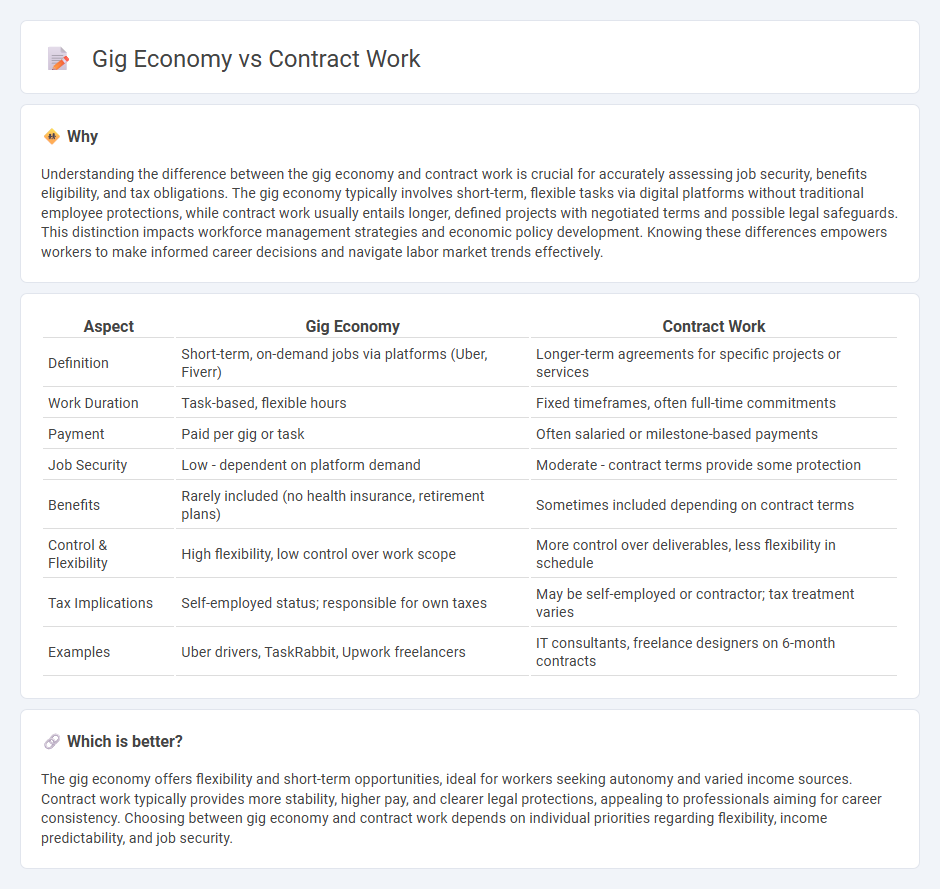
The gig economy offers flexible, short-term tasks often mediated through digital platforms, enabling workers to choose when and how they work. Contract work typically involves longer-term agreements with specific deliverables and legal obligations between businesses and professionals. Explore the key differences and impacts on labor markets to understand which model suits various economic needs.
Why it is important
Understanding the difference between the gig economy and contract work is crucial for accurately assessing job security, benefits eligibility, and tax obligations. The gig economy typically involves short-term, flexible tasks via digital platforms without traditional employee protections, while contract work usually entails longer, defined projects with negotiated terms and possible legal safeguards. This distinction impacts workforce management strategies and economic policy development. Knowing these differences empowers workers to make informed career decisions and navigate labor market trends effectively.
Comparison Table
| Aspect | Gig Economy | Contract Work |
|---|---|---|
| Definition | Short-term, on-demand jobs via platforms (Uber, Fiverr) | Longer-term agreements for specific projects or services |
| Work Duration | Task-based, flexible hours | Fixed timeframes, often full-time commitments |
| Payment | Paid per gig or task | Often salaried or milestone-based payments |
| Job Security | Low - dependent on platform demand | Moderate - contract terms provide some protection |
| Benefits | Rarely included (no health insurance, retirement plans) | Sometimes included depending on contract terms |
| Control & Flexibility | High flexibility, low control over work scope | More control over deliverables, less flexibility in schedule |
| Tax Implications | Self-employed status; responsible for own taxes | May be self-employed or contractor; tax treatment varies |
| Examples | Uber drivers, TaskRabbit, Upwork freelancers | IT consultants, freelance designers on 6-month contracts |
Which is better?
The gig economy offers flexibility and short-term opportunities, ideal for workers seeking autonomy and varied income sources. Contract work typically provides more stability, higher pay, and clearer legal protections, appealing to professionals aiming for career consistency. Choosing between gig economy and contract work depends on individual priorities regarding flexibility, income predictability, and job security.
Connection
The gig economy thrives on contract work by enabling individuals to engage in short-term, project-based assignments rather than traditional full-time employment. This model fosters flexibility and reduces overhead costs for businesses while providing workers with diverse income streams. The rise in digital platforms facilitating gig work underscores the growing interdependence between the gig economy and contract-based labor.
Key Terms
Flexibility
Contract work offers flexibility through fixed-term agreements that allow professionals to choose projects aligning with their skills and schedule preferences. The gig economy provides even greater adaptability, enabling workers to accept diverse, short-term tasks at any time without long-term commitments. Explore more about how each option can tailor work-life balance to individual needs.
Income Stability
Contract work often provides more predictable income through fixed-term agreements and scheduled payments, ensuring consistent cash flow for workers. The gig economy, characterized by on-demand tasks, tends to have fluctuating earnings due to variable job availability and client demand. Explore detailed comparisons and strategies to enhance income stability in both work models.
Employment Classification
Employment classification significantly impacts worker rights and benefits, with contract work typically involving defined terms, specific deliverables, and often a longer duration, whereas gig economy roles usually encompass short-term tasks with greater flexibility but fewer protections. Misclassification risks legal consequences and affects access to healthcare, retirement plans, and unemployment benefits. Explore how accurate employment classification shapes the future of work and safeguards both employers and workers.
Source and External Links
What Is a Contract Job, and How Does It Work in 2025? - Upwork - A contract job involves a professional being hired to complete a specific task or project for a business within a set time frame and for a fixed fee, providing flexibility for both the worker and employer.
Contract Jobs, Employment in New York, NY | Indeed - Contract jobs in New York City cover a wide range of industries and roles, from technical and healthcare to business and operations, typically lasting for a specified duration with defined terms.
$26-$81/hr Remote Contract Jobs in New York City, NY - ZipRecruiter - Remote contract jobs in NYC offer opportunities for professionals to work from anywhere, requiring industry experience, strong communication skills, and the ability to manage time effectively for project-based assignments.
 dowidth.com
dowidth.com